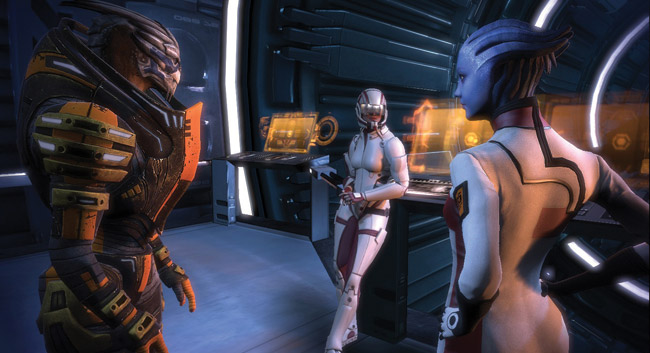OMG
The 'Mass Effect' Effect
How a study of a popular video game series could revolutionize an industry

Becoming a robot-astronaut-ballerina is no easy feat. It requires years of study and practice, flexibility, creativity, and a willingness to become part-machine. Luckily, Kimberly Shashoua eventually outgrew her childhood ambition and instead focused on a more traditional field of study: video games.
Shashoua, a master’s student in social work, has been evaluating the first three games in the popular Mass Effect series to develop what she’s calling “virtual narrative therapy.”
“Video games have the potential to teach people about the world in a safe way,” Shashoua says. “Virtual narrative therapy takes the pro-social aspects of video games and helps players translate that into real life.”
While video-games-as-therapy isn’t particularly new to the field of psychology, Shashoua’s approach is: Rather than developing games meant for therapeutic use, she is exploring the inherent therapeutic potential in popular games. Mass Effect 3, which was released in 2012, sold nearly a million copies in North America in its first 24 hours alone. Shashoua says its multiple play options make it ideal for her research.
She describes a scenario in which the main character, Commander Shepard, encounters a grieving crewmember: “Players can choose how to respond to the crewmember, and it’s like emotional support on training wheels. The player isn’t thrust into the situation, but since they can choose a response, it’s a very different experience from merely watching someone give support.”
These and other situational and emotional conflicts arise throughout the game, and the player remains an active participant in resolving issues and navigating complicated social situations. It’s essentially a safe place to work on real-world problems that people face every single day.
“When 26 percent of people meet the criteria for mental illness, there just aren’t enough resources to go around,” says Shashoua. “Virtual narrative therapy could narrow that gap.”
With a steady buzz of outside interest and work forthcoming in the National Social Science Journal and the National Proceedings Index of the National Social Science Association, Shashoua’s Mass Effect study is poised to be a game-changer.

















